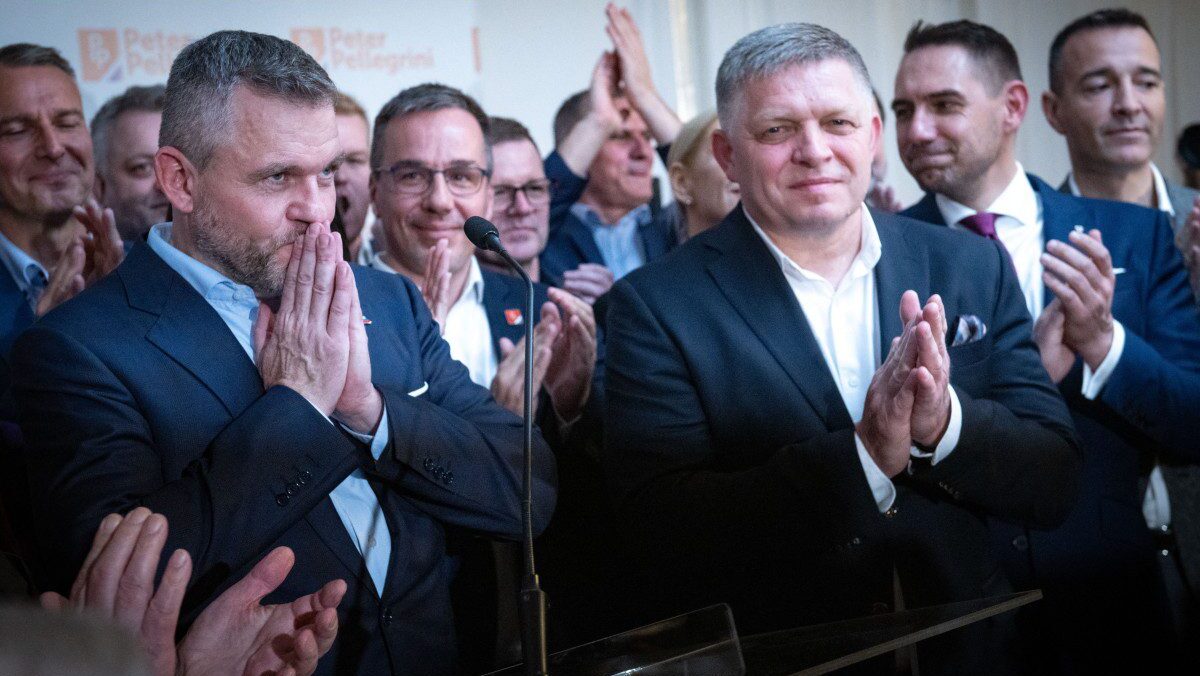
Presidential candidate Peter Pellegrini (L) and Slovak Prime Minister Robert Fico (R) speak to journalists after the announcement of Pellegrini’s victory in the second round of the Slovak presidential elections, April 6, 2024 in Bratislava, Slovakia.
Photo: VLADIMIR SIMICEK / AFP
Former Prime Minister Peter Pellegrini achieved a relatively comfortable victory in Slovakia’s presidential election on Saturday, April 6th. An ally of sovereigntist-nationalist current Prime Minister Robert Fico, Pellegrini gained 53% in the second, final round of voting, while his rival, Europhile former Foreign Minister Ivan Korčok got 47%.
Slovakia, presidential election (run-off) results:
— Europe Elects (@EuropeElects) April 7, 2024
All polling stations counted
Pellegrini (Hlas-S&D): 53%
Korčok (*): 47%
➤ https://t.co/UNYq3A7dXc#Slovakia #Slovensko #Volby2024 pic.twitter.com/dQYAxsosNh
The role of president is largely ceremonial, but the head of state can veto laws—which Parliament can override with a simple majority—and challenge laws at the Constitutional Court. Pellegrini will likely be less of an obstacle to the nationalist government of Robert Fico than his predecessor, liberal Zuzana Čaputová, who has not seen eye-to-eye with the cabinet on several issues.
Ivan Korčok was the preferred candidate of the Western liberal elites and media outlets that have described both Fico and Pellegrini as “pro-Russian” for simply disagreeing with the mainstream EU thinking of sending more and more weapons to Ukraine in its fight against invading Russia.
Robert Fico, who came back to power for a fourth tenure as prime minister last October, has drawn the ire of both his EU and NATO allies for his nationalist stance: he has criticised pro-migration policies, EU-federalisation attempts, transgenderism, woke culture, sanctions against Russia, and has called for peace talks to end the war in Ukraine. His rhetoric has led to direct threats by EU institutions who have warned that EU funds could be withheld from Slovakia. Fico alluded to these threats in a video uploaded to his Facebook page on Sunday, in which he said Slovakia could face further “punishments” for not voting in Korčok.
After his election victory, Peter Pellegrini said he would “do everything for Slovakia to forever remain on the side of peace and not the side of war,” but he emphasised that his country would remain “a strong member of the EU and NATO.” Though the EU may not be comfortable with another sovereigntist victory in Slovakia, Pellegrini’s win was given an extra layer of legitimacy by the high turnout on Saturday: 61% of eligible voters took part in the election, a number not seen in a presidential election since 1999. Pellegrini said he wants to support the government in its efforts to improve people’s lives, and that the presidency would not be a pro-opposition “opportunistic power centre” as it has been under his predecessor.
Despite the “undesired” outcome of the election for the EU institutions, Ursula von der Leyen, President of the European Commission congratulated Pellegrini, and urged him to “promote our common EU values.”
Congratulations @PellegriniP_ on your election as president of Slovakia.
— Ursula von der Leyen (@vonderleyen) April 7, 2024
I wish you lots of success in your new duties and Iook forward to working with you on the important challenges the EU and Slovakia face together,
Let’s continue to promote our common EU values.
Meanwhile, sovereigntist-conservative Hungarian Prime Minister, Viktor Orbán—another thorn in the side of liberals across Europe—called the Slovakian election “a big win for the advocates of peace all around Europe!”
My heartfelt congratulations to @PellegriniP_ on his overwhelming victory at the Slovak presidential elections. A big win for the people of 🇸🇰 and a big win for the advocates of #peace all around Europe! Blahoželáme, pán prezident!
— Orbán Viktor (@PM_ViktorOrban) April 7, 2024
